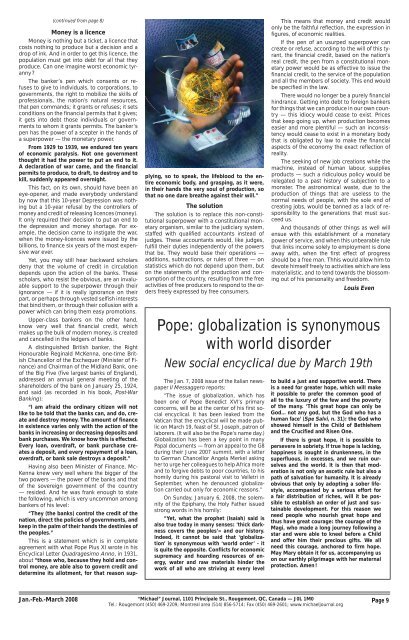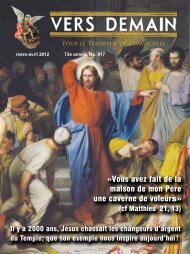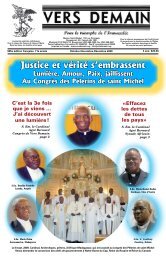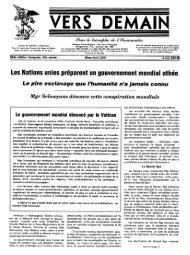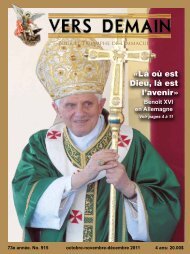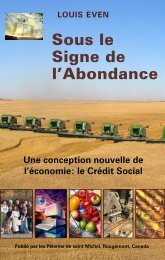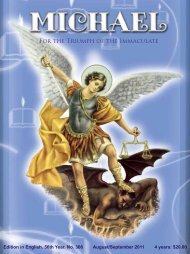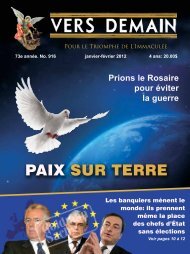Pierre Marchildon, Full-time Pilgrim of St. Michael
Pierre Marchildon, Full-time Pilgrim of St. Michael
Pierre Marchildon, Full-time Pilgrim of St. Michael
Create successful ePaper yourself
Turn your PDF publications into a flip-book with our unique Google optimized e-Paper software.
Jan.-Feb.-March 2008<br />
(continued from page 8)<br />
Money is a licence<br />
Money is nothing but a ticket, a licence that<br />
costs nothing to produce but a decision and a<br />
drop <strong>of</strong> ink. And in order to get this licence, the<br />
population must get into debt for all that they<br />
produce. Can one imagine worst economic tyranny?<br />
The banker’s pen which consents or refuses<br />
to give to individuals, to corporations, to<br />
governments, the right to mobilize the skills <strong>of</strong><br />
pr<strong>of</strong>essionals, the nation’s natural resources,<br />
that pen commands; it grants or refuses; it sets<br />
conditions on the financial permits that it gives;<br />
it gets into debt those individuals or governments<br />
to whom it grants permits. The banker’s<br />
pen has the power <strong>of</strong> a scepter in the hands <strong>of</strong><br />
a superpower — the monetary power.<br />
From 1929 to 1939, we endured ten years<br />
<strong>of</strong> economic paralysis. Not one government<br />
thought it had the power to put an end to it.<br />
A declaration <strong>of</strong> war came, and the financial<br />
permits to produce, to draft, to destroy and to<br />
kill, suddenly appeared overnight.<br />
This fact, on its own, should have been an<br />
eye-opener, and made everybody understand<br />
by now that this 10-year Depression was nothing<br />
but a 10-year refusal by the controllers <strong>of</strong><br />
money and credit <strong>of</strong> releasing licences (money).<br />
It only required their decision to put an end to<br />
the depression and money shortage. For example,<br />
the decision came to instigate the war,<br />
when the money-licences were issued by the<br />
billions, to finance six years <strong>of</strong> the most expensive<br />
war ever.<br />
Yet, you may still hear backward scholars<br />
deny that the volume <strong>of</strong> credit in circulation<br />
depends upon the action <strong>of</strong> the banks. These<br />
scholars, who resist the obvious, are an invaluable<br />
support to the superpower through their<br />
ignorance — if it is really ignorance on their<br />
part, or perhaps through vested selfish interests<br />
that bind them, or through their collusion with a<br />
power which can bring them easy promotions.<br />
Upper-class bankers on the other hand,<br />
know very well that financial credit, which<br />
makes up the bulk <strong>of</strong> modern money, is created<br />
and cancelled in the ledgers <strong>of</strong> banks.<br />
A distinguished British banker, the Right<br />
Honourable Reginald McKenna, one-<strong>time</strong> British<br />
Chancellor <strong>of</strong> the Exchequer (Minister <strong>of</strong> Finance)<br />
and Chairman <strong>of</strong> the Midland Bank, one<br />
<strong>of</strong> the Big Five (five largest banks <strong>of</strong> England),<br />
addressed an annual general meeting <strong>of</strong> the<br />
shareholders <strong>of</strong> the bank on January 25, 1924,<br />
and said (as recorded in his book, Post-War<br />
Banking):<br />
“I am afraid the ordinary citizen will not<br />
like to be told that the banks can, and do, create<br />
and destroy money. The amount <strong>of</strong> finance<br />
in existence varies only with the action <strong>of</strong> the<br />
banks in increasing or decreasing deposits and<br />
bank purchases. We know how this is effected.<br />
Every loan, overdraft, or bank purchase creates<br />
a deposit, and every repayment <strong>of</strong> a loan,<br />
overdraft, or bank sale destroys a deposit.”<br />
Having also been Minister <strong>of</strong> Finance, Mc-<br />
Kenna knew very well where the bigger <strong>of</strong> the<br />
two powers — the power <strong>of</strong> the banks and that<br />
<strong>of</strong> the sovereign government <strong>of</strong> the country<br />
— resided. And he was frank enough to state<br />
the following, which is very uncommon among<br />
bankers <strong>of</strong> his level:<br />
“They (the banks) control the credit <strong>of</strong> the<br />
nation, direct the policies <strong>of</strong> governments, and<br />
keep in the palm <strong>of</strong> their hands the destinies <strong>of</strong><br />
the peoples.”<br />
This is a statement which is in complete<br />
agreement with what Pope Pius XI wrote in his<br />
Encyclical Letter Quadragesimo Anno, in 1931,<br />
about “those who, because they hold and control<br />
money, are able also to govern credit and<br />
determine its allotment, for that reason sup-<br />
plying, so to speak, the lifeblood to the entire<br />
economic body, and grasping, as it were,<br />
in their hands the very soul <strong>of</strong> production, so<br />
that no one dare breathe against their will.”<br />
The solution<br />
The solution is to replace this non-constitutional<br />
superpower with a constitutional monetary<br />
organism, similar to the judiciary system,<br />
staffed with qualified accountants instead <strong>of</strong><br />
judges. These accountants would, like judges,<br />
fulfill their duties independently <strong>of</strong> the powers<br />
that be. They would base their operations —<br />
additions, subtractions, or rules <strong>of</strong> three — on<br />
statistics which do not depend upon them, but<br />
on the statements <strong>of</strong> the production and consumption<br />
<strong>of</strong> the country, resulting from the free<br />
activities <strong>of</strong> free producers to respond to the orders<br />
freely expressed by free consumers.<br />
The Jan. 7, 2008 issue <strong>of</strong> the Italian newspaper<br />
Il Messaggero reports:<br />
“The issue <strong>of</strong> globalization, which has<br />
been one <strong>of</strong> Pope Benedict XVI’s primary<br />
concerns, will be at the center <strong>of</strong> his first social<br />
encyclical. It has been leaked from the<br />
Vatican that the encyclical will be made public<br />
on March 19, feast <strong>of</strong> <strong>St</strong>. Joseph, patron <strong>of</strong><br />
laborers. (It will also be the Pope’s name day.)<br />
Globalization has been a key point in many<br />
Papal documents — from an appeal to the G8<br />
during their June 2007 summit, with a letter<br />
to German Chancellor Angela Merkel asking<br />
her to urge her colleagues to help Africa more<br />
and to forgive debts to poor countries, to his<br />
homily during his pastoral visit to Velletri in<br />
September, when he denounced globalization<br />
carried out only for economic reasons.”<br />
On Sunday, January 6, 2008, the solemnity<br />
<strong>of</strong> the Epiphany, the Holy Father issued<br />
strong words in his homily:<br />
“Yet, what the prophet (Isaiah) said is<br />
also true today in many senses: ‘thick darkness<br />
covers the peoples’» and our history.<br />
Indeed, it cannot be said that ‘globalization’<br />
is synonymous with ‘world order’ - it<br />
is quite the opposite. Conflicts for economic<br />
supremacy and hoarding resources <strong>of</strong> energy,<br />
water and raw materials hinder the<br />
work <strong>of</strong> all who are striving at every level<br />
This means that money and credit would<br />
only be the faithful reflection, the expression in<br />
figures, <strong>of</strong> economic realities.<br />
If the pen <strong>of</strong> an usurped superpower can<br />
create or refuse, according to the will <strong>of</strong> this tyrant,<br />
the financial credit, based on the nation’s<br />
real credit, the pen from a constitutional monetary<br />
power would be as effective to issue the<br />
financial credit, to the service <strong>of</strong> the population<br />
and all the members <strong>of</strong> society. This end would<br />
be specified in the law.<br />
There would no longer be a purely financial<br />
hindrance. Getting into debt to foreign bankers<br />
for things that we can produce in our own country<br />
— this idiocy would cease to exist. Prices<br />
that keep going up, when production becomes<br />
easier and more plentiful — such an inconsistency<br />
would cease to exist in a monetary body<br />
that is obligated by law to make the financial<br />
aspects <strong>of</strong> the economy the exact reflection <strong>of</strong><br />
reality.<br />
The seeking <strong>of</strong> new job creations while the<br />
machine, instead <strong>of</strong> human labour, supplies<br />
products — such a ridiculous policy would be<br />
relegated to a past history <strong>of</strong> subjection to a<br />
monster. The astronomical waste, due to the<br />
production <strong>of</strong> things that are useless to the<br />
normal needs <strong>of</strong> people, with the sole end <strong>of</strong><br />
creating jobs, would be banned as a lack <strong>of</strong> responsibility<br />
to the generations that must succeed<br />
us.<br />
And thousands <strong>of</strong> other things as well will<br />
ensue with this establishment <strong>of</strong> a monetary<br />
power <strong>of</strong> service, and when this unbearable rule<br />
that links income solely to employment is done<br />
away with, when the first effect <strong>of</strong> progress<br />
should be a free man. Thhis would allow him to<br />
devote himself freely to activities which are less<br />
materialistic, and to tend towards the blossoming<br />
out <strong>of</strong> his personality and freedom.<br />
Louis Even<br />
Pope: globalization is synonymous<br />
with world disorder<br />
New social encyclical due by March 19th<br />
to build a just and supportive world. There<br />
is a need for greater hope, which will make<br />
it possible to prefer the common good <strong>of</strong><br />
all to the luxury <strong>of</strong> the few and the poverty<br />
<strong>of</strong> the many. ‘This great hope can only be<br />
God... not any god, but the God who has a<br />
human face’ (Spe Salvi, n. 31): the God who<br />
showed himself in the Child <strong>of</strong> Bethlehem<br />
and the Crucified and Risen One.<br />
If there is great hope, it is possible to<br />
persevere in sobriety. If true hope is lacking,<br />
happiness is sought in drunkenness, in the<br />
superfluous, in excesses, and we ruin ourselves<br />
and the world. It is then that moderation<br />
is not only an ascetic rule but also a<br />
path <strong>of</strong> salvation for humanity. It is already<br />
obvious that only by adopting a sober lifestyle,<br />
accompanied by a serious effort for<br />
a fair distribution <strong>of</strong> riches, will it be possible<br />
to establish an order <strong>of</strong> just and sustainable<br />
development. For this reason we<br />
need people who nourish great hope and<br />
thus have great courage: the courage <strong>of</strong> the<br />
Magi, who made a long journey following a<br />
star and were able to kneel before a Child<br />
and <strong>of</strong>fer him their precious gifts. We all<br />
need this courage, anchored to firm hope.<br />
May Mary obtain it for us, accompanying us<br />
on our earthly pilgrimage with her maternal<br />
protection. Amen!<br />
“<strong>Michael</strong>” Journal, 1101 Principale <strong>St</strong>., Rougemont, QC, Canada — J0L 1M0<br />
Tel.: Rougemont (450) 469-2209; Montreal area (514) 856-5714; Fax (450) 469-2601; www.michaeljournal.org<br />
Page 9


